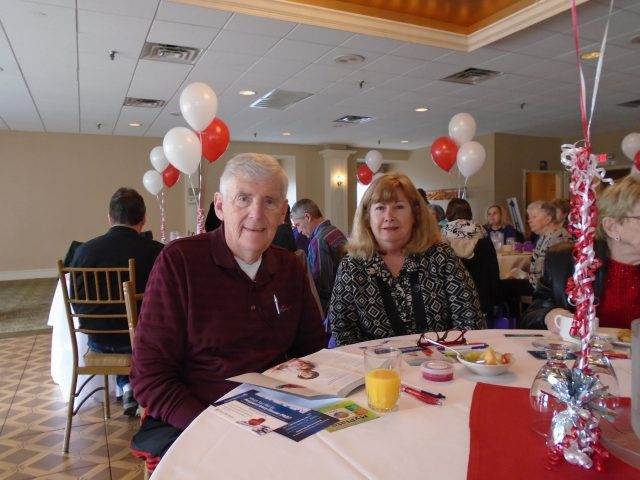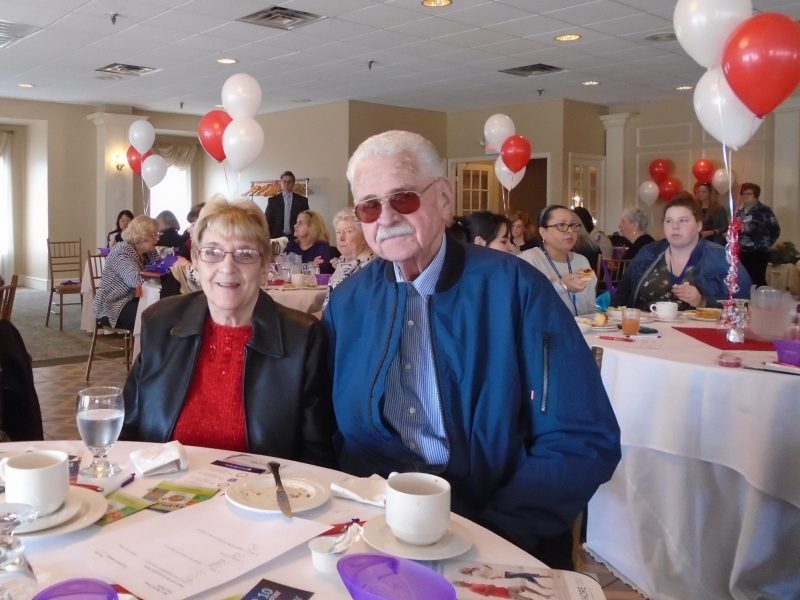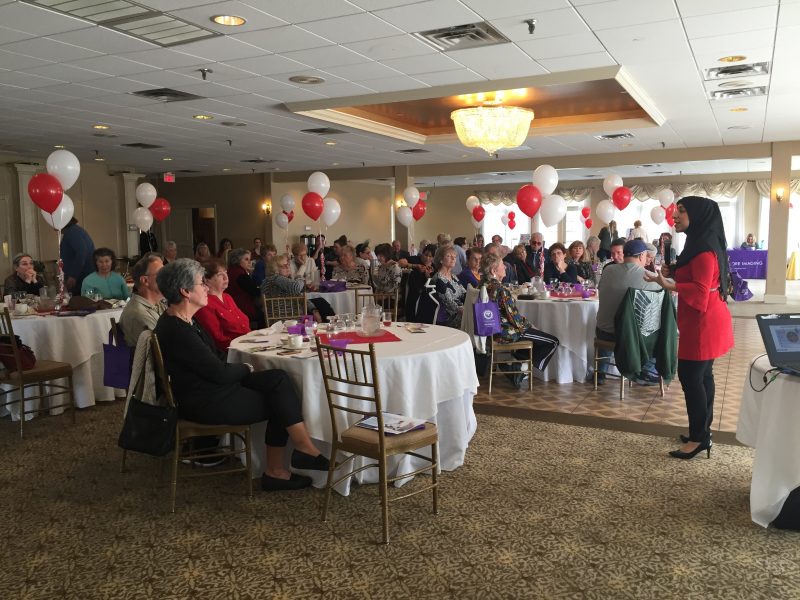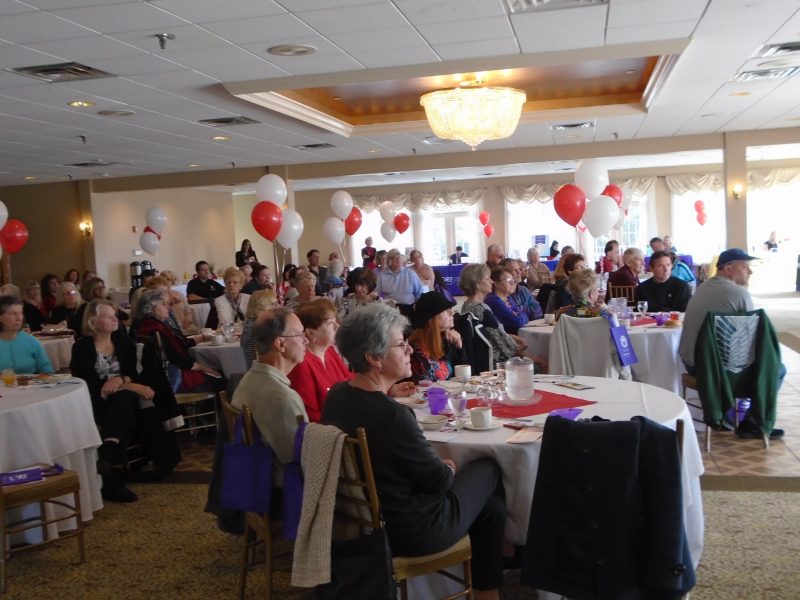
By Maddy Vitale
Donna Buker and her husband Bob knew what they were going to do Wednesday morning. After a recent health scare, the Ocean City couple vowed to learn more about how to live healthier.
The Bukers joined about 80 other guests for an event by Shore Medical Center and Penn Medicine. “Love Your Heart: A Free Community Education Breakfast,” offered guests insights from medical experts on topics including heart health, nutrition, smoking cessation programs and fitness, at Greate Bay Country Club in Somers Point.
Bob Buker, 77, had a stent put in his aorta, the main artery leading to his heart, just a week ago.
“He went to the cardiologist. He has always been healthy. We had no real signs. He just didn’t feel right,” Donna Buker explained, while seated at a table awaiting the start of the presentation. “From dawn until dusk he is on-the-go, riding his bike. He is very active.”
So when he wasn’t feeling up to par, the trip to the doctor likely saved his life, she said.
“They called it the widow maker,” Donna said. “We really are here today for nutritional advice. As a lay person, there is so much to learn.”
Bob Buker said eating healthy is definitely their focus.
“Diet is the most important thing,” he said.
The Bukers attribute Bob’s quick recovery from surgery to the technique used to put in the stent. But they also attribute some it, to a good exercise regimen.
Like the Bukers, audience members were there to listen to the experts. The presentations were by a cardiologist, a nutritional expert, a director of oncology services and a director of cardiac and pulmonary rehabilitation.
People raised their hands after each talk to ask about heart attack risks, blood thinners, medications and how they affect the heart, stenosis, cholesterol and nutritional advice.

John Quinn and his wife Marty, of Ocean City, attended the event as a preventative measure.
“We are interested in maintaining good health, rather than getting involved if we get sick,” John Quinn said.
Dr. Millee Singh, of Penn Cardiology Somers Point, explained the benefits of keeping your primary care physician and specialists in-the-know when it comes to all your health concerns.
One person asked if there is a link between NSAIDS – nonsteroidal anti-inflammatory medications – such as Celebrex or ibuprofen, and the risk of heart attack.
Singh said there is a link and that it is very important to alert your doctor if you are on heart medications, if you think that you would like to take an anti-inflammatory drug.
She added that 400 milligrams of ibuprofen, for example, wouldn’t be too much of a concern if taken occasionally, but taken regularly when under medical care for your heart could pose a risk.
“Anti-inflammatories have shown to increase your risk of heart attack, so it is important to tell your cardiologist,” Singh said. “Everyone is different.”
She also said doctors sometimes place patients on aspirins daily but there is a risk factor because it could cause bleeding in the stomach.
Asking questions and maintaining an open line of communication with your doctor is key to proper health, she said. And never think that what seems to be chest pain is nothing more than heartburn. It is better to be safe and get it checked out, Singh explained.
Chris Kozmor, director of cardiac and pulmonary rehabilitation at Shore’s Center for Outpatient Rehabilitation, has been a nurse for 50-plus years.
Throughout her career she has held one constant piece of advice to give to patients. “Get up and move,” Kozmor said.
“You can’t change your heredity. But 80 percent of the things we can change or manage,” Kozmor said. “We set you up in a training program. Say you just had a stent put in. You are always monitored. If we see abnormal changes, we stop your exercise and we talk to the doctor immediately.”
There is one goal in mind.
“We want to get you back to what you liked doing before,” she said.
Positive lifestyle changes, avoiding stress, eating healthy and exercising are the ways to improved health, she said.
“Many people in here are retired,” Kozmor said. “You worked hard to get here. Start slowly with your exercise and build up.”
Joseph Johnston, director of oncology services at Shore Cancer Center, offered some facts about smoking and cessation programs.
Johnston talked about incentives to quit smoking, counseling sessions, dangers of tobacco use, and explained to a guest that E-cigarettes have been shown to be just as dangerous as smoking tobacco products.

Saba Zahid, patient experience manager, food and nutrition services at Shore Medical Center, explained during the event that everyone needs fat. And everyone needs carbohydrates.
“You need fat for your body to function and absorb your fat-soluble vitamins D, E, K,” she said.
When it came to carbs, don’t cut them all out, Zahid stressed.
“You need about 130 grams of carbohydrates daily for your brain to function,” Zahid said. “The glucose in carbs is needed.”
And get your fiber from veggies, or breads, grains, and if you have to – do a supplement like a Metamucil.
Fish, lean chicken, lean beef, egg whites over the yokes, nuts, beans, fruits and vegetables, are all important for a balanced, healthy diet.
The average amount of sodium consumed by a person in a day is 3,400 milligrams when we need about 1,500 milligrams daily.
Zahid offered healthy tips for people trying to avoid or lessen salt intake. Sometimes an acid, such as lemon or vinegar squirted into the food, could satisfy the urge to pour salt into the food. She said consumers should opt for products that are lower in sodium. High sodium foods include breads, cured meats, soups, and poultry.
Ask for sauces and condiments, Zahid said, many have high sugar or salt content, so if you are out to eat, ask for it on the side.
According to a release from the hospital, Shore Medical Center’s Cardiovascular Services feature a team experienced doctors, nurses and support staff providing cardiovascular health services with a special emphasis on advanced diagnosis, education and prevention. With its partnership with Penn Cardiology, Shore has brought university-setting cardiac and vascular services to the community hospital environment.
For more information about Shore Medical Center visit www.shoremedicalcenter.org








